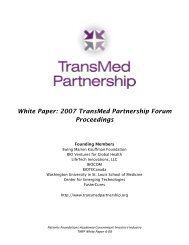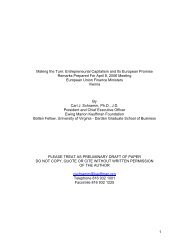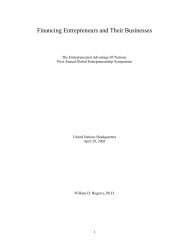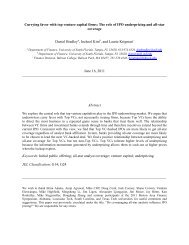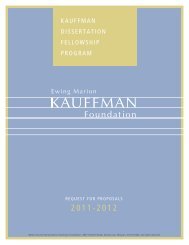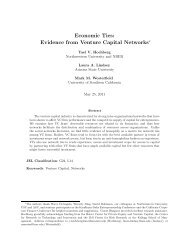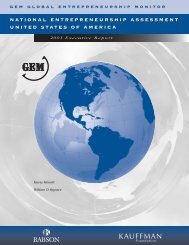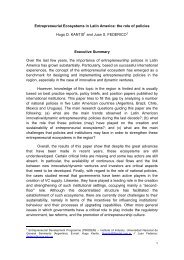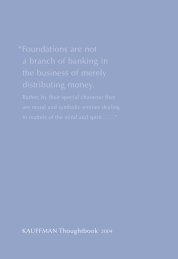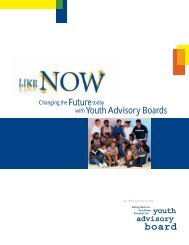Financing Child Care in the United States - Ewing Marion Kauffman ...
Financing Child Care in the United States - Ewing Marion Kauffman ...
Financing Child Care in the United States - Ewing Marion Kauffman ...
Create successful ePaper yourself
Turn your PDF publications into a flip-book with our unique Google optimized e-Paper software.
LOTTERIES AND GAMING<br />
EARLY CHILDHOOD DEVELOPMENT,<br />
EDUCATION AND CARE FUND<br />
(MISSOURI)<br />
DESCRIPTION<br />
The Early <strong>Child</strong>hood Development, Education and <strong>Care</strong><br />
(ECDEC) Fund supports start–up, expansion, operation<br />
and improvement of preschool programs; certificates for<br />
low–<strong>in</strong>come families (def<strong>in</strong>ed as below 185 percent of<br />
<strong>the</strong> federal poverty <strong>in</strong>come guidel<strong>in</strong>es) to purchase early<br />
childhood development, care and education; <strong>in</strong>creased<br />
rates of child care subsidy reimbursement for accredited<br />
programs; and certificates for early childhood education<br />
for low–<strong>in</strong>come families with children under age 3<br />
who care for <strong>the</strong>ir children at home. The ECDEC Fund<br />
receives fund<strong>in</strong>g from <strong>the</strong> Gam<strong>in</strong>g Commission Fund,<br />
which is <strong>the</strong> repository for state revenues from gambl<strong>in</strong>g<br />
fees.<br />
WHEN ESTABLISHED<br />
Legislation was passed <strong>in</strong> 1998 establish<strong>in</strong>g <strong>the</strong> ECDEC<br />
Fund for FY1999. The first appropriation was authorized<br />
<strong>in</strong> May 1999. The first programs began operat<strong>in</strong>g <strong>in</strong> <strong>the</strong><br />
1999–00 school year.<br />
ANNUAL AMOUNT<br />
For FY1999–00, <strong>the</strong> ECDEC Fund appropriation is<br />
approximately $21 million. The annual total <strong>in</strong> <strong>the</strong> ECDEC<br />
Fund is def<strong>in</strong>ed as 100 percent of <strong>the</strong> “rema<strong>in</strong><strong>in</strong>g net<br />
proceeds” of <strong>the</strong> Gam<strong>in</strong>g Commission Fund, determ<strong>in</strong>ed<br />
after support<strong>in</strong>g several veterans’ and national guard<br />
programs (approximately $9 million). In any given year,<br />
<strong>the</strong> ECDEC Fund is subject to appropriation. Funds are<br />
adm<strong>in</strong>istered by <strong>the</strong> Department of Elementary and<br />
Secondary Education (DESE) and <strong>the</strong> Department of<br />
Social Services (DSS). The statutory allocation of <strong>the</strong>se<br />
funds is as follows:<br />
• 60 percent for a competitive grant program to support<br />
early childhood development, education and care<br />
programs;<br />
• 48 percent is appropriated to DESE;<br />
• 12 percent is appropriated to DSS;<br />
• 30 percent to DSS;<br />
• 10 percent for certificates for low–<strong>in</strong>come families<br />
to purchase early childhood development, education<br />
and care;<br />
• 10 percent for subsidy rate <strong>in</strong>creases for accredited<br />
centers and homes;<br />
• 10 percent for certificates for low–<strong>in</strong>come families<br />
with children under age 3 whose parents stay at<br />
home with <strong>the</strong> children to purchase early childhood<br />
education; and<br />
• 10 percent undesignated and jo<strong>in</strong>tly adm<strong>in</strong>istered<br />
by DESE and DSS, which may be used for an<br />
evaluation, which is required by statute.<br />
SERVICES FUNDED<br />
The ECDEC Fund expands access and improves <strong>the</strong><br />
quality of services. Programs funded through DSS are<br />
required to meet state child care licens<strong>in</strong>g requirements<br />
with<strong>in</strong> one year of receiv<strong>in</strong>g funds. Programs funded<br />
through DESE must commit to becom<strong>in</strong>g state–licensed<br />
with<strong>in</strong> one year of receiv<strong>in</strong>g a grant and to becom<strong>in</strong>g<br />
accredited with<strong>in</strong> three years. In addition to Missouri’s<br />
own early childhood accreditation, accreditation systems<br />
of five national organizations are accepted by DSS:<br />
National Association for <strong>the</strong> Education of Young <strong>Child</strong>ren<br />
(NAEYC), National Association for Family <strong>Child</strong> <strong>Care</strong>,<br />
Council on Accreditation of Services for <strong>Child</strong>ren and<br />
Families, National Early <strong>Child</strong>hood Program Accreditation<br />
and National School Age <strong>Care</strong> Alliance. Only Missouri<br />
accreditation and NAEYC accreditation are accepted by<br />
DESE. The legislation requires DESE and DSS to<br />
conduct a four–year evaluation study with program and<br />
comparison groups to determ<strong>in</strong>e program impact and<br />
report <strong>the</strong> results to <strong>the</strong> legislature <strong>in</strong> 2002.<br />
HOW FUNDS DISTRIBUTED<br />
The competitive preschool program funds (<strong>the</strong> first 60<br />
percent) are distributed through grants, with DESE and<br />
DSS hold<strong>in</strong>g separate competitions. Preference is given<br />
for new programs, programs targeted to areas of <strong>the</strong><br />
state with high need, programs for children with special<br />
needs, programs that offer non–traditional hours and/or<br />
those which serve high concentrations of low–<strong>in</strong>come<br />
families. The legislation requires that community <strong>in</strong>put <strong>in</strong>to<br />
applications for fund<strong>in</strong>g must be documented and that<br />
public school programs must establish a parent advisory<br />
committee.<br />
For FY1999–00, <strong>the</strong> DESE preschool program funds<br />
were distributed through a two–phase competitive grant:<br />
<strong>the</strong> first round was limited to public school districts; <strong>the</strong><br />
second round was open to all providers of early education<br />
for 3– and 4–year–olds. A portion of <strong>the</strong> DSS<br />
competitive preschool funds for FY1999–00 was used<br />
for a grants program to create community partnerships<br />
between Early Head Start grantees and family child care<br />
homes and centers. These grants will improve <strong>the</strong> quality<br />
of services <strong>in</strong> <strong>the</strong>se sites and offer certificates to parents<br />
to purchase care <strong>in</strong> <strong>the</strong>m.<br />
The DSS funds are distributed through <strong>the</strong> same<br />
mechanism as o<strong>the</strong>r child care subsidies and certificates.<br />
The subsidy rate <strong>in</strong>crease for accredited programs is<br />
20 percent above a program’s current rate. The six<br />
accreditation systems noted above are accepted. The<br />
10 percent allocated to certificates for low–<strong>in</strong>come<br />
families with children under 3 whose parents are at<br />
home was to be a competitive grant program to<br />
communities, beg<strong>in</strong>n<strong>in</strong>g <strong>in</strong> 2000.<br />
48




